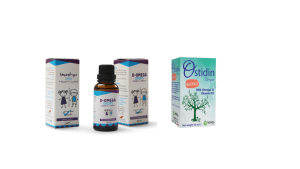As parents, we aspire to nurture our children’s physical health, intellectual growth, and emotional well-being. In this quest, we often focus on providing a balanced diet, adequate physical activity, and an enriching learning environment. However, we must also be attentive to our children’s emotional health. A critical but often underappreciated part of this puzzle is the role of nutrition, and more specifically, the role of Omega-3 fatty acids. This is where D-Omega Drops can become a significant ally.
Childhood is a delightful whirlwind of learning, exploring, and growing. It’s a phase of life brimming with joy, curiosity, and discovery. However, it can also present challenges that influence a child’s mood and behavior. During these times, it’s essential to have nutritional support that can help manage these aspects. Omega-3 fatty acids, a key ingredient in D-Omega Drops, have shown promise in this domain.
Numerous studies have suggested the potential role of Omega-3 fatty acids in promoting emotional health. In a report published in the Journal of Child Psychology and Psychiatry, researchers found a correlation between Omega-3 intake and improved emotional regulation in children. This research suggests that Omega-3 fatty acids may help children better manage their moods and behaviors, contributing to overall well-being.
Another study in the European Journal of Clinical Nutrition pointed towards a potential benefit of Omega-3 supplementation in reducing symptoms of Attention Deficit Hyperactivity Disorder (ADHD). It suggested that children with a higher intake of Omega-3s might have improved attention and reduced hyperactivity-impulsivity, leading to better emotional control.
With D-Omega Drops, your child gets a daily dose of these essential Omega-3 fatty acids in an easy-to-consume format. D-Omega Drops are formulated with a child-friendly flavor and designed for effortless incorporation into your child’s routine. By providing your child with Omega-3-rich D-Omega Drops, you are supporting their physical health and fostering their emotional well-being.
However, it’s essential to note that while D-Omega Drops provide a convenient source of Omega-3, they should be part of a balanced diet rich in various nutrients. Likewise, Omega-3 supplements should work with other strategies for promoting emotional health in children, including open communication, consistent routines, and emotional coaching.
In conclusion, caring for your child’s emotional health is multifaceted. By incorporating D-Omega Drops into your child’s daily routine, you’re making a worthwhile investment in their emotional well-being, helping them to navigate the complexities of childhood with a more balanced mood and better behavior control. Omega-3 fatty acids are a small ingredient that can make a big difference, shaping your child’s journey into a more joyful and fulfilling childhood.





